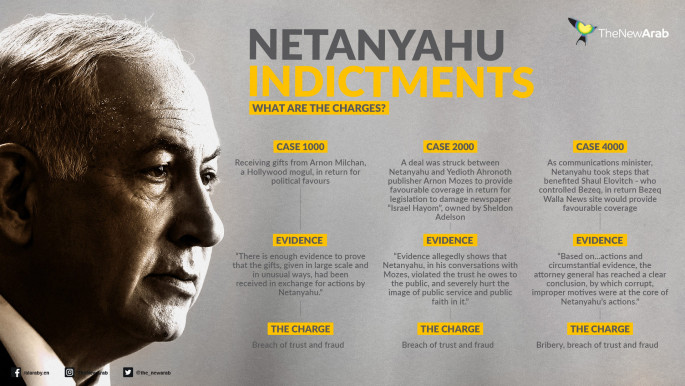Trump's support to boost Netanyahu re-election campaign
US President Donald Trump's role in Prime Minister Binyamin Netanyahu's electoral campaign gets its star turn this week when the two allies meet in Washington ahead of Israeli polls.
The billionaire president has already been featured on giant campaign billboards in Israel shaking hands and smiling with Netanyahu, and the premier has shared video of Trump calling him "strong" and a "winner".
But Trump's support has gone far beyond photos and words as Netanyahu fights a tough re-election battle ahead of April 9 polls while under threat of indictment for corruption.
On Thursday, after new opinion polls showed Netanyahu losing ground to his electoral rivals, Trump took to his beloved Twitter account to present the Israeli leader with what many analysts saw as a campaign gift.
Again breaking with longstanding international consensus, Trump said "it is time" to accept Israel's sovereignty over the Golan Heights, which it seized from Syria in the 1967 Six-Day War.
The tweet granted Netanyahu exactly what he had been pushing for without asking for anything in return, at least publicly.
Netanyahu pronounced it a Purim "miracle" - referring to the Jewish holiday Israel was celebrating the same day - and phoned Trump to tell him he had "made history".
But Trump said it had nothing to do with Israeli politics.
"I wouldn't even know about that," he told Fox Business Network.
'Personal things'
Trump's tweet was, however, only one of two boosts to Netanyahu's campaign from the White House the same day.
US Secretary of State Mike Pompeo, visiting Jerusalem at the same time, also denied politics played a role in his trip to the Western Wall alongside Netanyahu earlier on Thursday.
It was the first time such a high-ranking American official visited one of the holiest sites in Judaism located in mainly Israeli-occupied East Jerusalem, with an Israeli premier.
It offered Netanyahu a prime pre-election photo opportunity.
Further surprises may be in store this week, which features two meetings between Netanyahu and Trump at the White House: a "working meeting" on Monday and a dinner on Tuesday.
The first comes the same day Netanyahu's main electoral opponent, former military chief Benny Gantz, addresses the annual conference in Washington of the American Israel Public Affairs Committee (AIPAC).
Netanyahu is expected to speak at the pro-Israel lobby on Tuesday.
Trump relies on pro-Israel evangelical Christians in the United States as part of his electoral base and has moved US policy firmly in Israel's favour - most notably by declaring Jerusalem Israel's capital in 2017.
But Netanyahu has also deployed his considerable powers of persuasion to charm the mercurial president he calls his "friend".
"Trump is very affected by personal things, and Bibi's stroked him a lot," said Jonathan Rynhold, political science professor at Israel's Bar-Ilan University, using Netanyahu's nickname.
"I'm sure he's also very affected by the last thing that was said to him, so whispering in his ear is (Trump's son-in-law Jared) Kushner, who's got a good relationship with Bibi."
'Cautious politician'
There has been talk in recent weeks about similarities in style between Trump and Netanyahu - although there are key differences.
Michael Oren, a former Israeli ambassador to the United States and now a deputy minister for diplomacy, said "they share a disdain for political correctness".
Using phrases that echo Trump's, Netanyahu has castigated the corruption investigations into his affairs as a "witch-hunt" and a plot aimed at forcing him from office.
He has sought to demonise his enemies and brokered a deal with an extreme-right political party many view as a racist.
Like Trump, he has employed the phrase "fake news" to combat tough coverage of him.
But, as Rynhold points out, underneath the rhetoric the 69-year-old Netanyahu is an "extremely cautious politician", intensely attuned to the direction of the electoral winds.
He has been prime minister for a total of 13 years and will be on track to surpass founding father David Ben-Gurion as Israel's longest-serving premier if he wins.
"What's changed is that in the last three years Bibi has sensed that the world is more populist and the centre of gravity in Israeli politics has shifted rightwards, so he's done the same," Rynhold said.
Netanyahu's meetings with Trump and his AIPAC speech will allow him to further his argument to Israeli voters that he has irreplaceable skills as a statesman.
Israel's political system does not offer its leaders a state of the union type address like those made by US presidents, and Oren said the annual AIPAC speech can fill that role.
"It also tends to be broadcast around prime time here," Oren said. "So it's an important platform for him."






 Follow the Middle East's top stories in English at The New Arab on Google News
Follow the Middle East's top stories in English at The New Arab on Google News
![Israeli forces ordered bombed Gaza's Jabalia, ordering residents to leave [Getty]](/sites/default/files/styles/image_330x185/public/2176418030.jpeg?h=a5f2f23a&itok=_YGZaP1z)

